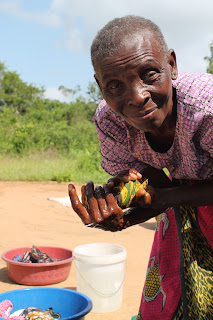Sundays are also timeless. There's no past, of how pristine the reef used to be, no present issues and no future with ongoing abhorrent corruption and potential violence in later this election year. The irony is I'm writing about these things on a Sunday, but for the most part the weekend is not just a break from work, but from the world too.
This week I felt less ready to just accept the status quo. In order to survive in a place like this one needs to adjust one's expectations and acceptance thresholds. Over the time I've been here this process has become second nature which is mostly useful for sanity, but not always the best. For example a big issue here at the moment is ring-netting, a destructive illegal fishing practise, which is going on in front of everyone's face, but very little is being done. On Monday I saw the boat fishing right next to the park and when I got home there was an email from the Dive Instructor to the whole community with photos of the boat. Suddenly there was a flurry of angry comments from various people. The KWS warden Korir sent his apologies saying he would deal with it after returning from upcountry and another guy said there was to be a meeting with fisheries. I was telling Joy, a volunteer helping with marine work, about it and said that I felt encouraged by the Warden's response and the upcoming meeting. Stanley overheard the conversation and shouted from the office next door, "Rubbish! This is an illegal practise carried out by one boat, whose owner we know. Just arrest him! What will you talk about in the meeting!?" Stanley is a respected community figure who has worked with A Rocha from the start. He followed through by emailing that comment on the chain going around. I was inspired and realised that I had spent so long learning to accept crazy situations I could no longer yell when necessary. In response, I called the second in command at KWS, Sergeant Tinga, and told him exactly what I thought. I could say it as a friend and colleague and someone who has been here a little while. I don't know whether it had any impact, but it certainly felt good to get it out!
It is so hard to exist when so much around you is going wrong. Its a tight-rope of apathy and despair, stress or defeated acceptance. And that is where I feel God comes in. He is the Rock on which we base our hope. There are signs of hope in the world, but it really can be a battle and we need to stand in Christ and fight the battle with love and gentleness and peacefully say, "This is not ok."
This Sunday, like many I've enjoyed at A Rocha, has been a time to rest and simply enjoy and recharge for the week. A time to remind myself what is beautiful and what we should strive for.
 |
| Hawksbill turtle |
 |
| Ring netters in action |





































